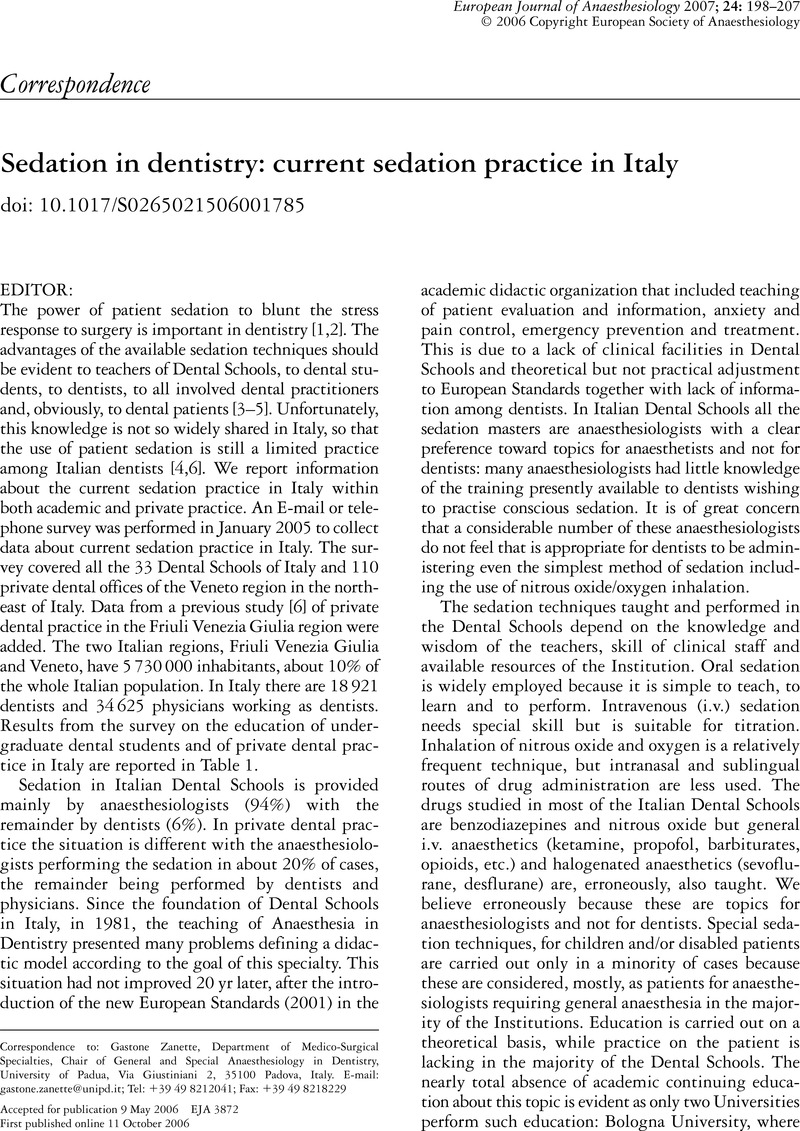Crossref Citations
This article has been cited by the following publications. This list is generated based on data provided by Crossref.
2007.
Current awareness: Pharmacoepidemiology and drug safety.
Pharmacoepidemiology and Drug Safety,
Vol. 16,
Issue. 9,
Tzabazis, A. Z.
and
Koppert, W.
2007.
Opioid-induced hyperalgesia or opioid-withdrawal hyperalgesia?.
European Journal of Anaesthesiology,
Vol. 24,
Issue. 9,
p.
811.
Richebé, Philippe
Janvier, Gérard
and
Simonnet, Guy
2008.
Hypersensibilités postopératoires : conséquences cliniques.
Douleurs : Evaluation - Diagnostic - Traitement,
Vol. 9,
Issue. 2,
p.
73.
Chu, Larry F.
Angst, Martin S.
and
Clark, David
2008.
Opioid-induced Hyperalgesia in Humans.
The Clinical Journal of Pain,
Vol. 24,
Issue. 6,
p.
479.
Richebé, Philippe
Janvier, Gérard
and
Simonnet, Guy
2008.
La tolérance aiguë aux opiacés : ses implications cliniques en anesthésie.
Le Praticien en Anesthésie Réanimation,
Vol. 12,
Issue. 1,
p.
4.
Ho, Tony W.
Rodgers, Anthony
and
Bigal, Marcelo E.
2009.
Impact of Recent Prior Opioid Use on Rizatriptan Efficacy. A Post Hoc Pooled Analysis.
Headache: The Journal of Head and Face Pain,
Vol. 49,
Issue. 3,
p.
395.
Chu, Larry F.
Clark, David
and
Angst, Martin S.
2009.
Acute Pain Management.
p.
114.
Freye, Enno
and
Levy, Joseph V
2010.
No hyperalgesia following opioid withdrawal after the oripavine derivative etorphine compared to remifentanil and sufentanil.
European Journal of Anaesthesiology,
Vol. 27,
Issue. 2,
p.
174.
da Cunha Leal, Plínio
Clivatti, Jefferson
Garcia, João Batista Santos
and
Sakata, Rioko Kimiko
2010.
Opioid-Induced Hyperalgesia (OIH).
Brazilian Journal of Anesthesiology,
Vol. 60,
Issue. 6,
p.
639.
Chu, Larry F.
Dairmont, Jutta
Zamora, Abigail K.
Young, Chelsea A.
and
Angst, Martin S.
2011.
The Endogenous Opioid System Is Not Involved in Modulation of Opioid-Induced Hyperalgesia.
The Journal of Pain,
Vol. 12,
Issue. 1,
p.
108.
Westermann, Robert W.
Hu, Jennifer
Hagen, Mia S.
Willey, Michael
Lynch, Thomas Sean
and
Rosneck, James
2018.
Epidemiology and Detrimental Impact of Opioid Use in Patients Undergoing Arthroscopic Treatment of Femoroacetabular Impingement Syndrome.
Arthroscopy: The Journal of Arthroscopic & Related Surgery,
Vol. 34,
Issue. 10,
p.
2832.
Westermann, Robert W.
2019.
Editorial Commentary: Scoping Knees With Osteoarthritis and Opioid Dependence? Brace Yourself for Postop Pain.
Arthroscopy: The Journal of Arthroscopic & Related Surgery,
Vol. 35,
Issue. 2,
p.
581.
Coeckelenbergh, Sean
Doria, Stefano
Patricio, Daniel
Perrin, Laurent
Engelman, Edgard
Rodriguez, Alexandra
Di Marco, Livia
Van Obbergh, Luc
Estebe, Jean-Pierre
Barvais, Luc
and
Kapessidou, Panayota
2021.
Effect of dexmedetomidine on Nociception Level Index-guided remifentanil antinociception.
European Journal of Anaesthesiology,
Vol. 38,
Issue. 5,
p.
524.
Guichard, Leah
Hirve, Axel
Demiri, Migena
and
Martinez, Valeria
2022.
Opioid-induced Hyperalgesia in Patients With Chronic Pain.
The Clinical Journal of Pain,
Vol. 38,
Issue. 1,
p.
49.



